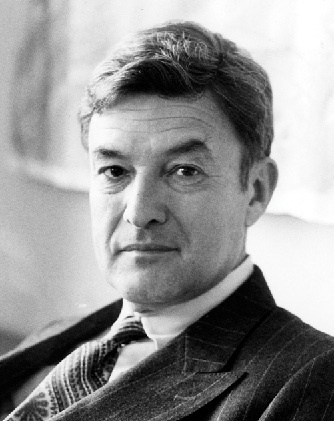Columbia College | Columbia University in the City of New York
Jack Greenberg ’45, LAW’48, Former Dean of the College, Law School Professor and Civil Rights Attorney

Dan Pollard
Jack Greenberg ’45, LAW’48, an emeritus dean of the College, emeritus Law School professor, influential civil rights attorney and former leader of the NAACP Legal Defense and Educational Fund (LDF), died on October 12, 2016, in New York City. He was 91.
Greenberg was born on December 22, 1924, to Jewish parents from Poland and Romania. He grew up in Brooklyn and the Bronx and, as he recounted in his 1994 memoir, Crusaders in the Courts: How a Dedicated Band of Lawyers Fought for the Civil Rights Revolution, early in his life developed an acute awareness of disadvantage and inequality.
Greenberg entered the College intending to become an accountant, like his father, but said that his absorption in his Core and Humanities classes steered him toward human rights work. He entered the Navy in 1941 and recalled being disturbed by the brazen racial prejudice he witnessed. His time in the military included in 1945 serving as a deck officer aboard a tank landing ship in the Pacific Ocean theater and fighting in the battles of Iwo Jima, Okinawa and Iheya Jima.
After the war, Greenberg enrolled in the Law School and was particularly affected by Walter Gellhorn LAW’31’s “Legal Survey” course, which offered students the opportunity to gain work experience with civil rights organizations. During his four semesters in the course, Greenberg worked for the American Civil Liberties Union, the American Jewish Congress and the LDF, writing briefs and other legal papers.
After graduating from the Law School as a Harlan Fiske Stone Scholar, Greenberg was recommended by Gellhorn to Thurgood Marshall for a position at the LDF; 11 days before his 28th birthday, Greenberg was arguing one of the key cases under Brown v. Board of Education before the Supreme Court. Marshall, who had joined the federal bench in 1961, appointed Greenberg that same year to succeed him as director-counsel of the LDF, causing friction in both the African-American and Jewish communities. Greenberg litigated the 1961 case that resulted in James Meredith’s integration of the University of Mississippi, and 1972’s Furman v. Georgia, in which the high court put in place a de facto moratorium on capital punishment in the United States. All told, Greenberg argued 40 cases in front of the Supreme Court, as well as hundreds of similar cases in the lower courts, fighting for many rights previously denied to black Americans, including voting rights, equal pay for equal work and fair housing. He co-founded the Mexican American Legal Defense and Educational Fund, drafted a New York City law that denied tax exemptions to private clubs that discriminated on the basis of race or gender and founded the Earl Warren Legal Training Program.
In 1984, Columbia presented Greenberg the honorary Doctor of Laws degree for his efforts toward “furthering social equality.” Later in life, he worked on global issues, particularly on the discriminated Roma population in Europe.
Greenberg left the LDF in 1984 and joined the Law School, where he had been an adjunct starting in 1970, as a professor and vice dean. He became the Alphonse Fletcher, Jr. Professor of Law and taught courses in constitutional law, civil rights and human rights law, as well as a class on civil procedure and a seminar called “Kafka and the Law.” He created the school’s Human Rights Internship Program, which has placed more than 1,500 students at organizations around the world.
Greenberg was dean of the College 1989–93. He maintained his passion and devotion to civil rights on campus, spearheading a mission to increase diversity within the College faculty and student population. He stepped down as dean in 1993 in a University shake-up but remained a professor at the Law School until retiring last year.
His books include Race Relations and American Law (1959), Judicial Process and Social Change: Constitutional Litigation (1985), Crusaders in the Courts: How a Dedicated Band of Lawyers Fought for the Civil Rights Revolution (1994) and even a cookbook, co-authored with former Harvard Law dean James Vorenberg, Dean Cuisine or the Liberated Man’s Guide to Fine Cooking (1990). He also published articles in the Columbia Law Review, Harvard Law Review, Yale Law Journal, NYU Law Review and Michigan Law Review.
In 2001, Greenberg was awarded the Presidential Citizens Medal by President Clinton, who deemed him “a crusader for freedom and equality.” Greenberg remained hopeful, writing in his memoir, “...while we should seek justice for its own sake, those for whom that is not reason enough should understand that without justice there will be no peace.”
Greenberg’s marriage to Sema Ann Tanzer ended in divorce in 1970. Greenberg is survived by his wife of 46 years, Deborah M. Greenberg LAW’57 (née Cole); children from his first marriage, David, Sarah GSAS’86 and Ezra; his wife’s children, Suzanne Greenberg and William Cole ’84, whom he adopted; brother, Daniel; and five grandchildren. He was predeceased in 2011 by a son, Josiah LAW’81.
— Lisa Palladino and Aiyana K. White ’18
Issue Contents
Published three times a year by Columbia College for alumni, students, faculty, parents and friends.
Columbia Alumni Center
622 W. 113th St., MC 4530, 6th Fl.
New York, NY 10025
212-851-7852
cct@columbia.edu
Columbia Alumni Center
622 W. 113th St., MC 4530, 4th Fl.
New York, NY 10025
212-851-7488
ccalumni@columbia.edu

